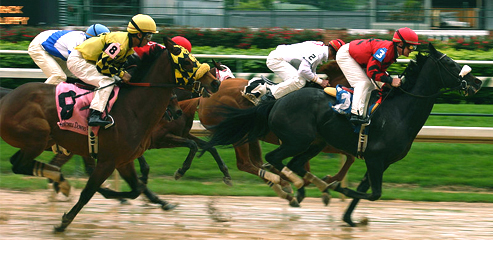By Janet Elliott
AUSTIN – The Churchill Downs racetrack wants a federal judge to stop the Texas Racing Commission from enforcing a law making it illegal for the track to accept online bets from Texans.
The lawsuit, filed Sept. 21 in Austin against the executive director and members of the racing commission, said the state recently decided to start enforcing a decades-old law that requires bettors to visit a licensed Texas track to place their bids on out-of-state races like the Kentucky Der by. That law discriminates against the interests of other states in violation of the federal Commerce Clause, the lawsuit claims.
by. That law discriminates against the interests of other states in violation of the federal Commerce Clause, the lawsuit claims.
Churchill Downs, which owns the iconic Louisville track, as well as ones in Illinois, Florida and Louisiana, is seeking a preliminary injunction against enforcing the Texas Racing Act’s requirements that all wagers placed in Texas must be made in person.
The racing commission estimates that Texans spent $185 million in online pari-mutuel wagering from 2005-2009. That is expected to grow to $327 million in 2010-2014. That translates to an estimated $88 million in lost revenue for the state budget and Texas racetracks from 2005 to 2014.
Bill Childs, a spokesman for the racing commission, said eight other online wagering websites have voluntarily stopped taking bets from users who live in Texas. Churchill Downs’ online wagering website, Twinspires.Com, is the only one that is refusing to comply, he said.
The state has set a Sept. 25 deadline for Churchill Downs to comply with a subpoena seeking information about the company’s acceptance of wagers from Texas.
The lawsuit, filed by James Ho, a Dallas partner in Gibson, Dunn & Crutcher, said the state is abandoning its “longstanding truce” with other states “for one simple, but impermissible, reason: to generate more revenue for the commission, by shifting market share from out-of-state to in-state race tracks.”
Childs said state law had been clear that it was illegal for Texas residents to place online bets but there was ambiguity about the entity accepting the bets. He said the 2011 sunset legislation reauthorizing the commission added language expressly prohibiting the placing and accepting of online bets.
Childs “flatly disputes” that those changes were solely designed to shore up the commission’s budget. Lawmakers discussed money being lost to out-of-state tracks, but that was only one consideration in an overall change in how the racing commission is funded, he said.
Online gambling was a topic in the commission’s Strategic Plan 2011-2015. The report said that companies first appeared in 2000 to accept bets by telephone and through the Internet.
In 2006, Congress passed the Unlawful Internet Gambling and Enforcement Act, which prohibits banks from processing payments for illegal Internet gambling. But Congress carved out an exception that allows banks to process payments for Internet wagering on horse races.
Since the passage of the federal law, the number of companies taking pari-mutuel wagers has increased by 43 percent.
When Texans visit their local tracks to bet on races in other locations that are being simulcast, the state receives 1 percent of all wagers. Money from wagers also goes to Texas horse breeding programs and the tracks receive revenue from negotiated simulcast fees.
“Further losses of revenue to allocate to the horse and greyhound purses and the Texas breeders program will escalate the decline in race dates, quality of race animals in Texas racing, and the number of animals participating in the accredited Texas breeders program,” according to the strategic plan.
The lawsuit said the in-person rule deprives the majority of Texans the opportunity to wager on out-of-state races without the consent of one of its in-state competitors.
“This is tantamount to forcing Pepsi to sell its soda only through Coke vending machines – only if Coke consents – and only if Pepsi agrees to endure whatever marketing conditions Coke might demand and pay whatever fee Coke might impose,” the lawsuit states. “The resulting disadvantage to Pepsi is obvious. And the same is true here.”
